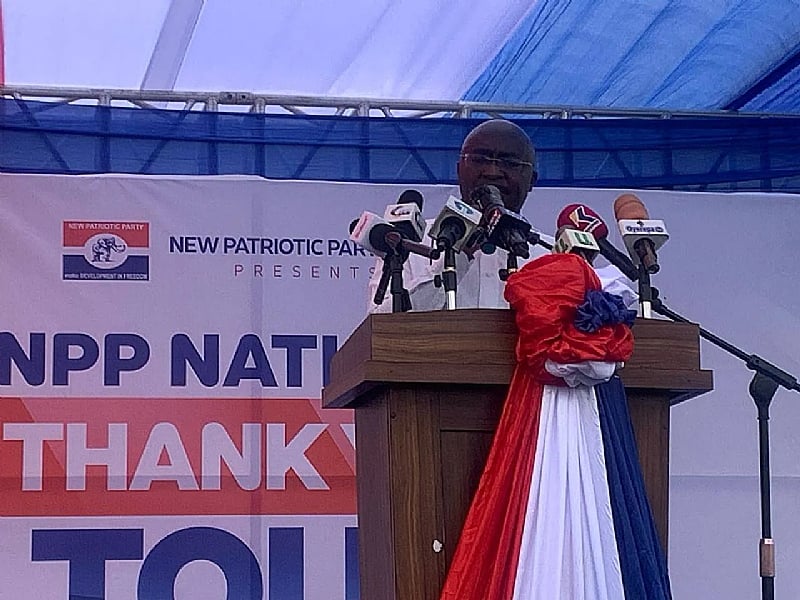Dr. Mahamudu Bawumia, the New Patriotic Party’s (NPP) chosen candidate for the 2024 presidential election, embarked on a nationwide “Thank You Tour” following the party’s recent electoral defeat. His inaugural address, delivered at Takoradi Technical University, offered a candid assessment of the factors that contributed to the NPP’s loss. Bawumia’s analysis identified both internal party weaknesses and external pressures that coalesced to create an environment ripe for the opposition’s victory. He characterized the defeat as a consequence of multiple converging challenges, ranging from economic difficulties and unpopular policy decisions to internal discord and strategic missteps. This introspective approach, unusual in the immediate aftermath of an election loss, signals Bawumia’s intention to address the root causes of the defeat and rebuild the party on a stronger foundation.
Bawumia’s address placed significant emphasis on the economic hardships faced by Ghanaians during the NPP’s tenure. He acknowledged the rising cost of living, driven by escalating prices for goods and services, as a major factor contributing to public dissatisfaction. This economic strain, he argued, eroded the NPP’s support base and fueled a sense of discontent that the opposition capitalized on. Bawumia’s willingness to acknowledge the government’s shortcomings in managing the economy suggests a departure from the typical defensive posture adopted by parties after an electoral loss. His admission underscores a commitment to understanding the public’s concerns and addressing the economic anxieties that contributed to the NPP’s defeat.
Beyond economic woes, Bawumia highlighted several policy decisions that further alienated the electorate. He cited the controversial E-Levy, a tax on electronic transactions, as a prime example of a policy that, despite internal party dissent, was implemented and ultimately proved unpopular. Similarly, the government’s decision to implement the Domestic Debt Exchange Programme (DDEP) as part of the IMF debt restructuring plan drew criticism and created further economic hardship, particularly for those holding government bonds. Bawumia’s open acknowledgement of these policy missteps indicates a willingness to learn from past mistakes and potentially recalibrate the party’s policy platform in the future.
Internal party dynamics also played a crucial role in the NPP’s defeat, according to Bawumia. He criticized the party’s perceived “arrogance of power,” manifested in a resistance to internal criticism and a refusal to consider alternative perspectives. He specifically pointed to the government’s reluctance to reshuffle officials, despite calls from within the party to do so. This stagnation, he argued, fostered a sense of complacency and disconnect from the concerns of both party members and the broader public. This admission of internal rigidity suggests a desire to foster a more inclusive and responsive party culture moving forward.
The combination of economic hardship, unpopular policies, and internal dissent, Bawumia argued, created an environment conducive to the opposition’s success. He noted that the National Democratic Congress (NDC), despite lacking a cohesive campaign message, effectively exploited the NPP’s internal divisions and amplified public dissatisfaction with the government’s performance. This observation highlights the strategic importance of party unity and the dangers of internal discord, especially during a closely contested election. Bawumia’s emphasis on the need for unity suggests a commitment to bridging internal divides and presenting a unified front in future elections.
Furthermore, Bawumia acknowledged the party’s failure to effectively campaign in its traditional strongholds and the detrimental impact of numerous uncompleted projects. These shortcomings, he argued, further weakened the NPP’s position and allowed the opposition to gain ground in areas where the NPP typically enjoys strong support. He specifically cited the Western Region as an example of a region where the party’s campaign efforts were insufficient. This acknowledgement of strategic failures underscores the need for a more robust and targeted campaign approach in the future. Bawumia’s analysis, therefore, serves as a call for introspection, unity, and strategic rebuilding within the NPP as the party prepares for the 2024 elections. His willingness to publicly address the party’s shortcomings and to accept responsibility for the defeat signals a commitment to learning from past mistakes and charting a new course for the future.


